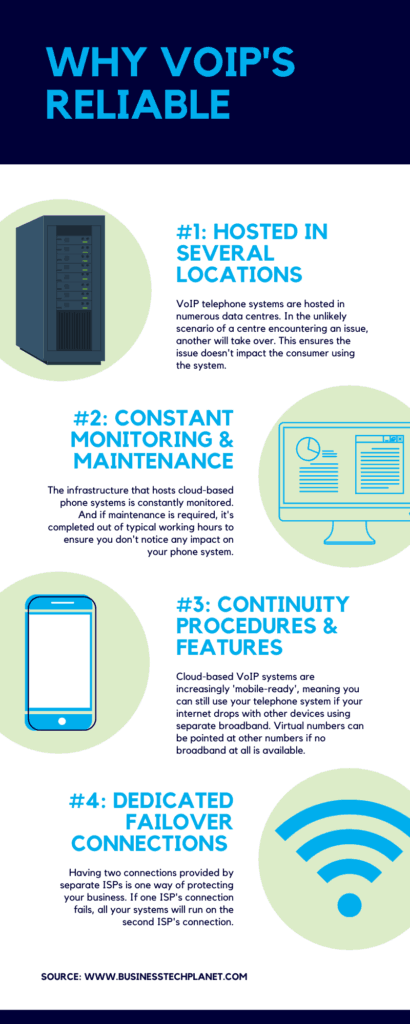VoIP is more widely used than ever, so you’ve probably heard the term before. Usually pronounced voyp, what does VoIP actually stand for? That’s what I’ll explain in this blog post before detailing what VoIP is and how it works.
What does VoIP stand for? VoIP stands for Voice over Internet Protocol. Voice over Internet Protocol technologies allow you to make calls using your broadband connection rather than a regular phone line.
When you break down the acronym, you can intuit what VoIP means and you can roughly determine how it works. I’m writing this blog post as a bit of a guide to VOIP, covering what it is and how it works. Hopefully it helps you to understand Voice over Internet Protocol better!
What is VoIP?
VoIP technologies give you the ability to make calls over the internet rather than a regular phone line. VoIP has been around for a long time, with a multitude of advancements since the early days of Skype, which still hangs around in people’s minds!
Now, more businesses than ever are using VoIP telephone systems. There are a host of reasons that businesses are using VoIP rather than traditional telephone systems, such as:
- Cost savings: VoIP is often much cheaper than a traditional business telephone system. Businesses across the world are saving a fortune thanks to VoIP. In fact, research firm IDC determined that a VoIP telephone system can reduce telephony-related costs by up to 30%.
- Greater mobility: A traditional telephone system is inextricably linked to your office. You can’t make use of your telephone system if you’re not in the office, meaning it isn’t very mobile. VoIP is more mobile because you can make and receive calls on a variety of devices no matter where you are while still using your office telephone system.
- Advanced features: VoIP technology gives you a range of features that you don’t get with a traditional telephone system or features you would have to pay more for if you had a traditional system. The best thing is you can manage most of these features yourself through an intuitive interface. VoIP gives you features such as:
- Advanced call management
- Call routing
- Auto-attendant
- Call analytics
- Call forwarding
VoIP is an excellent business telephony solution, but many businesses are put off VoIP because of its reliance on a broadband connection. If you don’t have a broadband connection, your VoIP telephone system won’t work. However, concerns about reliability are offset by the business continuity features that are included with a VoIP telephone system. For example, the ability to divert calls elsewhere or make and receive calls using your mobile over a mobile data connection.
I wrote a blog post previously, Are VoIP Phone Systems Reliable, which delved into the details of why VoIP technology is highly reliable. You can read that post by clicking here, but these are the primary reasons that VoIP is more reliable than you might think:
- Hosted in several locations: If you are using a hosted VoIP telephone system, your system will be hosted in numerous data centres. If one data centre goes down, this means that you won’t lose your telephone system. It’s highly unlikely that a data centre will go offline in any case, but there are backup data centres if one goes down.
- Constant monitoring: The infrastructure that hosts VoIP telephone systems is constantly monitored by providers. If there is any issue, providers are on top of it and finding a resolution, often before you’ll even notice. Maintenance takes place regularly to ensure the hardware continues to work correctly.
- Continuity procedures: Providers have a number of continuity procedures in place that prevent customers from being affected if anything happens in their data centres. VoIP is a mobile-ready solution, meaning that you can use your telephone system from anywhere – even when you’re not in the office.

VoIP can be an excellent telephony solution for a business but VoIP is only as reliable as your broadband connection. VoIP’s reliance on an internet connection is the only real drawback of the technology.
If you don’t have an internet connection, your VoIP telephone system won’t work. It really is as simple as that. While you can point calls elsewhere so you don’t miss any, the telephone system itself will not work as it should if you don’t have a broadband connection. You can avoid issues by having backup connections and so on, thereby mitigating the risk associated with relying upon your main connection.
An important consideration is whether or not your main internet connection will do the job. Is your main internet connection sufficient for Voice over Internet Protocol? If this is a question you cannot answer, it’s worthwhile reading my blog post How Much Bandwidth Is Needed For VoIP? In that blog post, I explain how much bandwidth is needed for VoIP (100Kbps downstream and upstream dedicated bandwidth) as well as how you can modify your system to decrease the amount of bandwidth you require.
You can change the codec that your VoIP telephone system uses to reduce the amount of bandwidth that is required by each concurrent call. I explain all about codecs in the aforementioned blog post, but some codecs require as much as 100Kbps downstream and upstream per call, whereas some require as little as 40Kbps up and down. Changing codecs can make a big difference to the amount of bandwidth your business requires.
This covers a lot of how VoIP actually works, but next, we’ll discuss the benefits of using VoIP.

Benefits Of Using VoIP
There are several VoIP telephone system advantages that all businesses using VoIP will benefit from. Here’s each advantage broken down into greater detail.
Low Costs
VoIP telephone systems are cheaper for businesses in numerous ways.
First and foremost, setting up VoIP is usually much cheaper than setting up a PBX. A PBX connects several landline phones in an office and requires a lot of onsite hardware. This means large upfront costs for businesses of any size, making it completely unaffordable for most.
Even small businesses wanting a PBX have to invest in expensive physical hardware. With a VoIP systems, no onsite hardware is required to set up the telephone system. Since broadband powers the service, all you need onsite is handsets (although these are actually optional) and a reliable broadband connection.
Depending on the number of users and the service you choose, you might not even need an engineer to set up your VoIP telephone system. Combine all these factors and VoIP systems are evidently much cheaper to set up than more traditional systems.
Secondly, VoIP is cheaper in the long run. According to data from IDT Express, VoIP calls can be 40 – 80% cheaper than calls using the PSTN network. The main reason for this is lower-than-ever data carriage costs. As high-speed broadband availability has increased, the cost of data carriage costs have dramatically reduced. Calls using the traditional infrastructure have stayed the same price, hence VoIP calls being so much cheaper.
Another way that VoIP is cheaper is that there are little or no repair and maintenance costs. Typically, support and maintenance fees are bundled in with your VoIP licence (basically a VoIP telephone line) meaning you never have unexpected costs to pay. If your PBX goes bust, you’ll have a massive expense to suddenly pay, which you’ll never get with VoIP.
You only pay for what you need with VoIP because you can add more features and users as you require them. This offers unprecedented scalability to users who no longer need to pay for services and lines they’re not using.
Higher Voice Quality
When VoIP first became available to consumers, it quickly gained a bad reputation for poor call quality. Voice quality was awful and calls would drop for no reason, which was massively off-putting to businesses for all the obvious reasons.
These days, VoIP calls tend to be very high quality with crisp and clear communications enabled by better broadband. Most businesses have fast and stable internet thanks to broadband developments over the last few years. As long as your business has fast and stable internet, voice quality will never be an issue on a VoIP phone call.
You don’t need to have the finest of internet connections for good quality VoIP calls, either. Virtually every business broadband solution will enable clear communication over the internet. VoIP calls are clear over 3G and 4G connections, for the most part, never mind business broadband!
Flexible
VoIP telephone systems are completely mobile-ready. You can make and receive calls no matter where you are as long as you have a data connection. The mobile-readiness of VoIP is one of its greatest advantages, as it means you can work on the go as required and never miss an important call again.
If you know that you’re going to be out of the office for a period of time, you can point all calls to your mobile phone. In fact, several providers have mobile applications available that give you all the features of your office telephone system on the go. You can fully manage your telephone system through a web interface anywhere that you have an internet connection. You can make changes and set up features such as call redirects from your mobile.
As the workforce becomes increasingly mobile, your business can be incredibly flexible if you have a VoIP telephone system. No matter the location of your employees, they can remain productive and stay in touch easily for remote collaboration.
Scalable
If you predict that your business will grow in the future, you probably want a telephone system that will grow with it. As you hire new employees, you want to easily add them to your telephone system quickly and without massive expense. A VoIP telephone system offers greater scalability than any other telephone system available.
Adding new users to your telephone system is as easy as phoning or emailing your provider to sort a new licence. Licences can be added to a VoIP system within mere minutes, so you can quickly have your new user set up to receive and make phone calls.
As you require new features, VoIP makes it easy to add them. As the number of phone calls you receive picks up, you can quickly enable new features to make handling calls easier, for example. This is just another way that a VoIP telephone system would scale with your business as your requirements grow.
